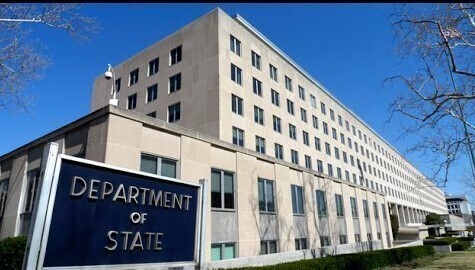hankyoreh
Links to other country sites 다른 나라 사이트 링크
US, China continue diplomatic competition in East Asia as Washington’s presidential election nears

With the US presidential election right around the corner, the US and China’s diplomatic competition over East Asia is intensifying once again.
The US State Department issued a statement on Sept. 27 titled “China’s Empty Promises in the South China Sea” in which it accused China of going back on its promise not to pursue militarization, a promise made by Chinese President Xi Jinping at the White House on Sept. 25, 2015, five years ago.
Leading up to the election, Trump administration officials have doubled down on China bashing with incendiary phrases. US Secretary of State Mike Pompeo said on July 23 that “the freedom-loving nations of the world must induce China to change,” while US President Donald Trump tweeted on July 21 about “our effort to defeat the Invisible China Virus.” The US is also asking its allies to take part in the encirclement of China.
In connection with this, Japan’s Ministry of Foreign Affairs announced on Sept. 25 that bureau chiefs from the Quad — the quadrilateral security dialogue between the US, Japan, Australia, and India — had held a video conference. The ministry said that the four countries had “agreed to keep pursuing practical cooperation on sustaining a free, open, prosperous, and rules-based Indo-Pacific through regular deliberations in the future including cabinet-level officials.” This meaning was held to handle technical preparations for the meeting of top diplomats from Quad that will be held in Tokyo in early October; Japan’s remarks confirm that the participating countries agreed to schedule regular meetings at each level, including the foreign minister level.
The US’ quick movements have prompted a rapid response from China. The Japanese press reported on Sept. 28 that the Chinese and Japanese governments were coordinating a visit to Japan in October by Chinese State Councilor and Foreign Minister Wang Yi. Wang’s visit to Japan, a key member of the Quad, is regarded as an attempt to strengthen communication between China and Japan while easing tensions. If Wang visits Tokyo, he’s also likely to drop by South Korea in order to review agreements reached by China and Korea at the end of last month, including speeding up the timeframe for Chinese President Xi Jinping’s visit to Korea.
What stands out amid the disturbing conflict between the US and China is the actions of the South Korean government. After arriving in the US on Sept. 27, Lee Do-hoon, South Korea's special representative for Korean Peninsula peace and security affairs, responded to a reporter’s question by saying that he “definitely” intended to discuss the end-of-war declaration that came up in South Korean President Moon Jae-in’s address to the UN General Assembly. “I think that if we sit down and talk about it, we can come to an understanding,” Lee said.
Since Pompeo will be visiting Japan to attend the Quad foreign ministers’ meeting, he could also stop by South Korea on the way to Japan to make a symbolic delivery of a DVD containing the US’ Fourth of July celebrations, which would be delivered to Kim Yo-jong, deputy director of the Central Committee of the Workers’ Party of Korea (WPK), as she requested in a statement back in July. Such a scenario, though admittedly unlikely, could lead to a breakthrough in North Korea-US dialogue, as well as inter-Korean dialogue.
By Gil Yun-hyung, staff reporter
Please direct comments or questions to [english@hani.co.kr]

Editorial・opinion
![[Editorial] Penalties for airing allegations against Korea’s first lady endanger free press [Editorial] Penalties for airing allegations against Korea’s first lady endanger free press](https://flexible.img.hani.co.kr/flexible/normal/500/300/imgdb/original/2024/0502/1817146398095106.jpg) [Editorial] Penalties for airing allegations against Korea’s first lady endanger free press
[Editorial] Penalties for airing allegations against Korea’s first lady endanger free press![[Editorial] Yoon must halt procurement of SM-3 interceptor missiles [Editorial] Yoon must halt procurement of SM-3 interceptor missiles](https://flexible.img.hani.co.kr/flexible/normal/500/300/imgdb/child/2024/0501/17145495551605_1717145495195344.jpg) [Editorial] Yoon must halt procurement of SM-3 interceptor missiles
[Editorial] Yoon must halt procurement of SM-3 interceptor missiles- [Guest essay] Maybe Korea’s rapid population decline is an opportunity, not a crisis
- [Column] Can Yoon steer diplomacy with Russia, China back on track?
- [Column] Season 2 of special prosecutor probe may be coming to Korea soon
- [Column] Park Geun-hye déjà vu in Yoon Suk-yeol
- [Editorial] New weight of N. Korea’s nuclear threats makes dialogue all the more urgent
- [Guest essay] The real reason Korea’s new right wants to dub Rhee a founding father
- [Column] ‘Choson’: Is it time we start referring to N. Korea in its own terms?
- [Editorial] Japan’s rewriting of history with Korea has gone too far
Most viewed articles
- 1Months and months of overdue wages are pushing migrant workers in Korea into debt
- 2Trump asks why US would defend Korea, hints at hiking Seoul’s defense cost burden
- 31 in 3 S. Korean security experts support nuclear armament, CSIS finds
- 4[Editorial] Yoon must halt procurement of SM-3 interceptor missiles
- 5Fruitless Yoon-Lee summit inflames partisan tensions in Korea
- 6[Guest essay] Maybe Korea’s rapid population decline is an opportunity, not a crisis
- 7[Editorial] Penalties for airing allegations against Korea’s first lady endanger free press
- 8Bills for Itaewon crush inquiry, special counsel probe into Marine’s death pass National Assembly
- 9[Column] Can Yoon steer diplomacy with Russia, China back on track?
- 10At heart of West’s handwringing over Chinese ‘overcapacity,’ a battle to lead key future industries